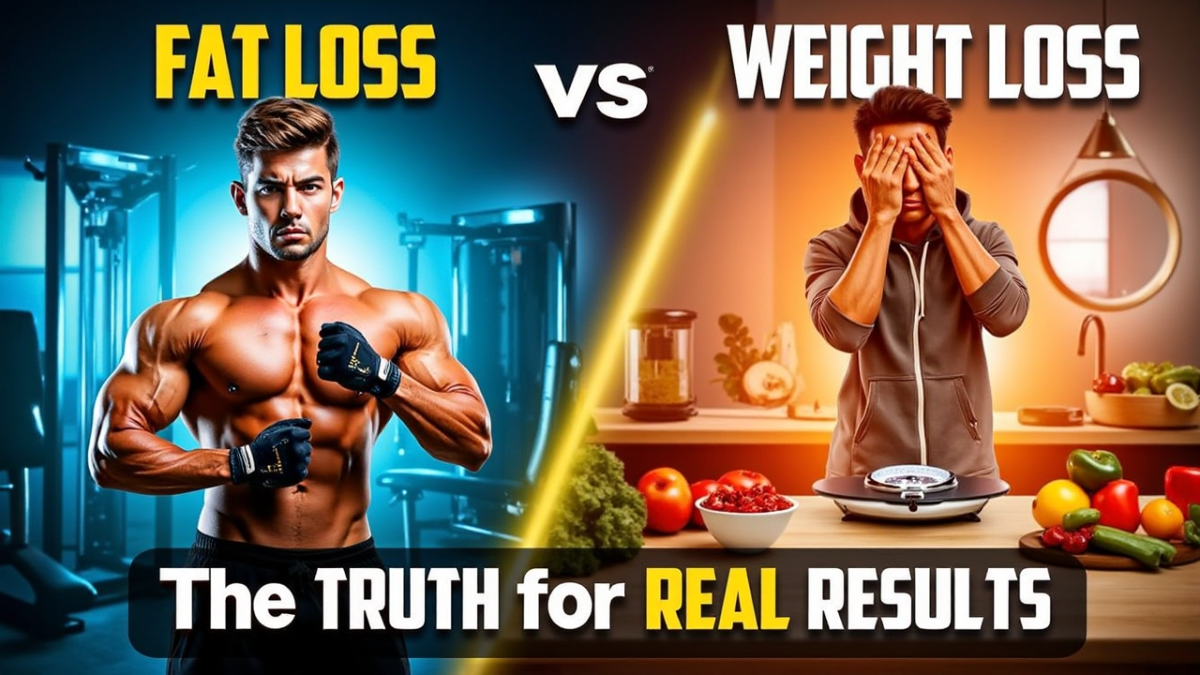[ad_1]
Maintaining a healthful body composition is very crucial because it without delay affects our ordinary properly-being. An ideal percentage of muscle, fats, and bone leads to improved physical capability, reduced danger of chronic illnesses, and progressed bodily performance. A balanced body composition promotes toughness, healthy getting old, and superb self confidence, which complements the first-class of existence. People often use the phrases fats loss and weight loss interchangeably, but are they really the identical? In this article, we will make clear this and clear all your doubts.
Difference between fat loss and weight loss

Fat loss focuses specially on decreasing extra frame fat, even as retaining muscular tissues. On the other hand, weight loss refers to a reduction in total frame weight, which include muscle, water, and fat. Effective fat loss improves frame composition and promotes lengthy-term health.
Understanding Fat Loss and Weight Loss in Detail
Fat loss means reducing the amount of body fat, which improves body composition and health. It can be achieved through diet, exercise, and sometimes medical intervention. Healthy fat loss aims to lose excess body fat while maintaining muscle mass. Unhealthy fat loss practices such as extreme diets and quick fat loss methods can lead to muscle loss and health risks.
Weight loss manner a reduction in overall body weight, which includes fats, muscle, and water. Weight loss may be both willful (weight-reduction plan, exercising) or due to an illness (unhealthy weight reduction). Voluntary weight loss is accomplished thru controlled calorie consumption and bodily hobby with the purpose of enhancing fitness or appearance. Involuntary weight loss may be due to medical conditions, that can cause fitness problems. It is important to preserve a stability in the technique to weight loss.
Causes of fat accumulation and weight fluctuations
Causes of fat accumulation:
Many factors influence fat accumulation in the body such as genetics, environmental factors, lifestyle, and physical activity. The following factors mainly contribute to fat accumulation:
- Genetics: Genetic factors affect fat accumulation, such as metabolism, fat storage tendencies, and the distribution of fat in the body.
- Diet: Diet affects fat accumulation, especially if excess calories, saturated fat, and trans fat are consumed. Also, a balanced diet, which contains nutrient-rich foods, reduces fat accumulation.
- Physical Activity: Lack of physical activity increases fat accumulation, as it reduces the calories burned.
- Metabolism: Metabolism affects the body’s ability to burn calories. A slow metabolism can decrease calorie burning, increasing the risk of fat accumulation.
Causes of weight fluctuations:
- Dietary habits: Dietary habits affect weight fluctuations. Foods high in sugar and fat lead to weight gain, while a balanced diet keeps weight under control.
- Fluid retention: Sometimes, excess water can be retained in the body, causing a temporary increase in weight.
- Digestion and elimination: Poor digestion or bowel problems can cause temporary changes in weight. But true fat gain is not caused by this.
- Exercise: Exercise increases calorie consumption and helps in weight loss. Apart from this, exercise also helps in building muscles.
- Hormonal Changes: Hormonal changes can cause weight fluctuations, such as during pregnancy, menstruation or stress.
Subtle Differences Between Fat Loss and Weight Loss

Importance of Diet:
Calorie control is important for both fat loss and weight loss. You need to reduce your calorie consumption so that your body does not have a surplus of energy, which can be stored as fat.
Importance of Exercise:
Exercise is helpful in fat loss and weight loss, as it helps burn calories and maintain muscle mass. Both cardio and strength training types of exercise help in fat loss, while maintaining muscle mass is helpful.
In Summary
Both fat loss and weight loss are essential for improving health and frame composition. But it’s far important to understand that fat loss mainly includes losing extra frame fats, even as weight loss refers to a discount in universal frame weight, such as fats, muscle and water. For this, it’s far very crucial to comply with a proper weight-reduction plan, ordinary exercise and a healthful life-style.
Tips for healthy weight and fat loss:
- Eat a nutrient-rich diet and control calories.
- Increase protein intake to maintain muscle mass.
- Avoid highly processed foods and eat small meals.
- Exercise regularly and maintain a stable lifestyle.
Conclusion:
It is important to take a balanced and informed approach to the process of weight and fat loss. Quick solutions are often unsustainable and can harm health. A stable strategy that includes a balanced diet, regular exercise and gradual changes is best for a healthy life.
FAQs
1. What’s the difference between fat loss and weight loss?
Fat loss refers to reducing body fat percentage, while weight loss involves reducing overall body mass, which could include fat, muscle, and water weight.
2. Can you lose fat without losing weight?
Yes, it’s possible to lose fat without significant weight loss if you’re building muscle through exercise, as muscle weighs more than fat but increases metabolism and overall health.
3. Is it better to focus on fat loss or weight loss?
Focusing on fat loss is generally more beneficial for health and appearance, as it leads to a leaner body, while weight loss may result in muscle loss or dehydration.
[ad_2]
Source link













